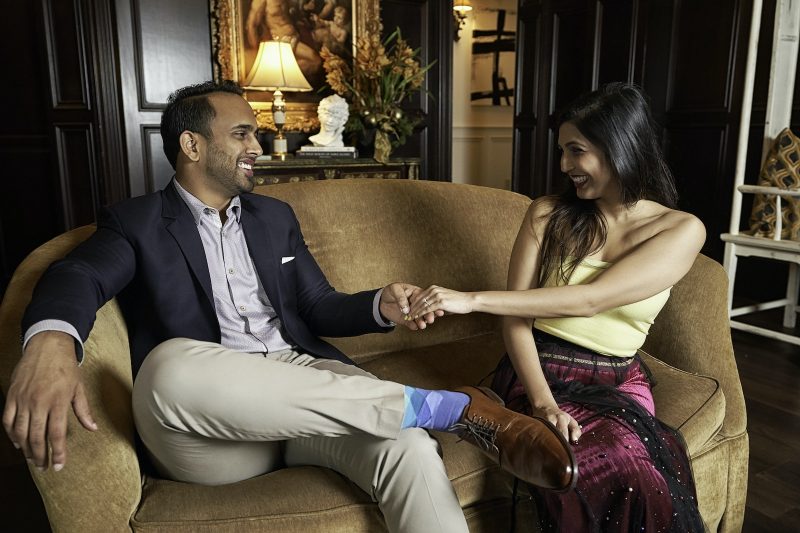The main goal of a first date
To achieve a successful first date with your potential partner, you must have a clear understanding of the main goal of the date. This section, “The main goal of a first date”, with its sub-sections: ‘Getting to know each other’, ‘Building attraction and chemistry’, ‘Assessing compatibility for a long-term relationship’, ‘Establishing clear communication’, and ‘Having fun and enjoying the experience’, will help you recognize and prioritize these key components, ultimately leading to a fulfilling first date.
Getting to know each other
The heart of any first meeting is to make a significant connection. Poise, assurance, and showing true interest in the other person are vital. By discussing your interests, characteristics and future goals, you can create an atmosphere of reliance and trust. Active listening, sympathy and respect are better than demonstrating power and bragging – they help you perceive the other individual’s world. A successful date means a steady exchange of words and building a foundation for potential later relations.
To make a lasting relationship, discovering shared interests and values is essential. It not only reveals shared passions but also reveals compatibility. Exploring backgrounds, experiences, and cultural aspects helps understand personality better. The goal is not only to measure attraction but also to see how suitable one is for longterm ties.
It’s important to be mindful of engagement and actively take part in the conversation. Asking open-ended questions helps keep the dialogue going even when there’s a break.
The saying goes “Cupid comes when you least anticipate it“. This was true for romance writer Debbie Macomber who found her husband on an arranged date, far away. This reinforces the idea that each connection has its own story and each first date contains endless possibilities. Chemistry isn’t only about sharing interests, it’s also about wanting to check each other’s phones.
Building attraction and chemistry
The main aim of a first date is to form a link that creates a connection and chemistry between the two people. This can be achieved in different ways, such as by talking, body language or common interests.
It’s key that both parties show a real interest in each other, sparking interesting conversations and even attraction. This may mean asking meaningful questions or expressing personal experiences that have emotion and help you understand each other better.
To have a successful interaction, you need an open outlook, good listening skills, and honest communication. Creating a connection can’t be done by coercion or manipulation – it needs an organic flow of interest, truthfulness, and inquisitiveness.
One way to stir up a spark could be finding out about each other’s hobbies or passions; for instance, taking a cooking class with each other or simply visiting a gallery they both like. This way, you can learn what makes each other tick and locate shared interests that will deepen your relationship.
Kelly and Sam’s first date was a perfect example of these principles. Despite the initial unease, Sam proved he was interested in Kelly’s career objectives. He paid attention and showed empathy when Kelly spoke about her struggles as an entrepreneur, and praised her at every turn. During the evening, they discovered their shared love of photography, talking about topics from art history to the newest technological DSLR camera advancements.
To figure out if you’re suitable for a long-term relationship, it’s like ordering a pizza – make sure the toppings are all compatible, so you won’t get sick later!
Assessing compatibility for a long-term relationship
Meeting someone new? Want to know if they’ll make a lasting partner? Evaluate their interests, values, and goals. Do they share your principles and beliefs? That’ll strengthen trust between you. A first date gives you a chance to learn each other’s personalities, so you can determine compatibility.
Analyze your potential partner’s ambitions and lifestyle choices. Do they fit with your objectives? If so, there may be potential for deepening the connection. But don’t just consider surface-level qualities. Go deeper and look at things like emotional intelligence and communication skills. Observing their body language and how they listen is also important.
I once went on a date with someone who shared my values and goals. But, during our conversation, he lacked empathy. I recognized this difference and knew we weren’t compatible. Communication is key – unless you’re trying to escape a bad date through the bathroom window.
Establishing clear communication
An initial meet-up with a potential partner calls for effective communication. This means exchanging thoughts, feelings and information between both parties. It’s important to ensure there’s no confusion or misunderstanding.
Good communication involves listening and expressing yourself clearly. Pay attention to body language, tone of voice and don’t be afraid to ask clarifying questions. This way, both people can express their needs, wants and dealbreakers.
Avoid interrupting or dominating the conversation – it could get in the way of understanding and respect. Keeping an open mind during the chat can help explore interests and build trust.
Enhance communication skills by using reflective listening techniques, like restating what the other said, to make sure they were heard. Take breaks from talking and try activities together.
To sum it up, effective communication on a first date is key to forming connections. Listen and express yourself, don’t interrupt, practice reflective listening and do activities. This will create a mutual understanding and strengthen relationships.
Having fun and enjoying the experience
A first date is all about having a good time and savoring the experience. Laughing, finding common interests, and swapping stories helps create a connection and lays the groundwork for further relations. Being relaxed lets you be yourself while focusing on mutual understanding, admiration, and attraction – all while indulging in great food or fun activities.
Plus, going for coffee is a great way to enjoy the smell of the beans while having stimulating conversations that bring out strong feelings. Keeping the chat upbeat and natural gives both people the chance to get to know each other’s personalities. This lets them become interested in each other’s lives, maybe even forming a romantic spark.
Creating special moments that let people share experiences and build a close bond is key to having a successful first date. Research reveals that most people pick partners based on similar values more than looks. Plus, studies show that pleasant memories lead to increased happiness in the long run (The Journal of Positive Psychology). So why go on a second date when you can just keep swiping?
Strategies for achieving the main goal
To achieve the main goal of a first date in “Strategies for achieving the main goal” with “What should be the main goal of a first date?” as the title, try some winning tactics. Asking open-ended questions, practicing active listening and showing genuine interest, sharing personal stories and experiences, practicing good manners and etiquette, and trying new activities together are potential sub-sections that can help you achieve a successful first date.
Asking open-ended questions
Uncovering valuable insights? Ask exploratory questions! Stimulate conversation and get participants to share their ideas. Avoid ‘yes’ or ‘no’ responses. Open-ended questions are a great starting point. Frame queries around concrete examples, not generalizations. Better understand customers’ needs and preferences. Also gain insight into any pain points they may have.
Pro Tip: Follow up on ambiguous answers to get clearer explanations. Listen attentively, or your lack of interest will be obvious.
Active listening and showing genuine interest
Engaging in mindful communication helps create a healthy exchange of ideas. Active listening is key. Show interest by using nonverbal cues, like eye contact and nodding. Ask meaningful questions to learn more. Genuinely listening with an open mind builds trust and respect. Avoid interrupting and try to pick up on unseen communication.
Successful listening requires genuine interest, not just hearing words. Proactively showing emotions deepens mutual understanding. With mutual support, we create an atmosphere for collaboration.
A colleague once shared a presentation experience. Unwanted due to co-workers multitasking with their devices, this had caused them to feel disheartened even with their hard work.
Sharing stories and experiences can help us avoid mistakes. Like a GPS – hear about someone else’s wrong turns to know which route to take.
Sharing personal stories and experiences
Narrating personal accounts and life experiences can be an effective tool for accomplishing the main goal.
People can connect to a story on a personal level, creating powerful impact and strong emotions. Relatable narratives and lived experiences can help build trust with the audience and provide a different point of view.
Personal stories are more memorable than facts and statistics. They give context and explain complex ideas in a simple way. Stories have the power to shift perspective, motivate action, modify behavior, change lives, and bring people together.
However, when sharing stories, authenticity is very important. People appreciate honesty. The stories must relate to the topic.
In addition, personal stories help audiences understand ideas by giving examples of real life situations.
An example is Barack Obama during the 2008 US Presidential Election cycle. He was playing cards with some older men at a diner as part of his campaign tour. One of them whispered “I’m scared.” Obama took time to talk with him about how he could help ease his fear, with cameras rolling. This experience has been remembered since. It shows the power of genuine interest in someone’s story – another form of empathy. Good manners don’t always get what you want, but they will stop you from getting what you don’t want.
Practicing good manners and etiquette
Demonstrating etiquette and social conventions is key. Displaying manners and following norms shows respect, strengthens relationships, and boosts influence. Folks can make a good impression and show their competence by being polite in social settings. It also helps avoid any awkwardness. Modesty and respect for others is essential. Use courteous language and don’t gossip or mock. Abide by dress codes and be punctual. Express appreciation with thank you notes. Unique details like holding doors open, being mindful of personal space when interacting, speaking clearly, and giving compliments naturally are important too.
A Forbes survey found that 89% of bosses think employees with good etiquette have a better chance of climbing the corporate ladder. So why not try rock climbing as couple’s therapy to see who trusts who more?
Trying new activities together
Opting for Unique Experiences Together is a great way to build stronger bonds. Here are some ideas to get you started:
- Go to an unfamiliar restaurant or try a new cuisine.
- Learn to dance, whether you’re a beginner or pro.
- Explore nature through a hike or walk in a new area.
- Check out a museum or art exhibit you haven’t seen.
- Be audience or participants at a game or concert.
- Create art together by attending workshops.
In addition, why not plan physical activities that challenge both of you? It’ll help create lasting memories, promote positive communication, and even improve your lifestyle.
Don’t let FOMO (Fear Of Missing Out) stop you from trying something new. The advantages are worth it. So start planning now! And don’t forget, steer clear of exes, therapy, and the apocalypse on first dates!
Common mistakes to avoid on a first date
To avoid common mistakes on a first date with the main goal of connecting with your partner, you must not talk only about yourself and avoid being too aggressive or pushy. Also, showing up late or canceling last minute, bringing up controversial topics, or being too focused on physical appearance or material possessions can ruin your chance of establishing a good connection.
Talking only about oneself
When on a first date, it is vital to consider it as a shared experience. Not just concentrating on yourself. Ask about their interests, and listen carefully to the answers. Pay attention to body language to make sure they are enjoying themselves. Silence can be helpful in building a bond too. Demonstrate empathy by talking about your own experiences. Don’t just talk about yourself. This way conversation becomes a learning opportunity. Remember, the goal of a first date is to get to know each other better. Focus on creating a connection, instead of two individual stories. Don’t be overly aggressive – it won’t work!
Being too aggressive or pushy
When it comes to a first date, don’t be too strong. Being too aggressive can make your date feel scared. Instead, take it slow and observe their body language and what they say.
Let the conversation flow. Don’t interrupt or dominate it. Avoid topics that could offend them. Also, don’t pressure them for physical contact or commitment. Rushing into anything isn’t good. Respect their boundaries. Communicate and make sure you both know what you’re looking for.
Showing up late or canceling last minute? That’s a sign you’re not that into them. Don’t be afraid to just say it.
Showing up late or canceling last minute
Being unreliable can be a disaster on a first date. So, it’s important to avoid any last-minute cancellations or arriving late. Here are some mistakes to avoid:
- Bailing on the day
- Not warning the other person
- Not giving an excuse for changing the plan
- Giving the impression of being unreliable
- Not managing your time properly even with planning
- Disregarding your date’s efforts to make the plan work.
If something urgent comes up, make sure to inform the other person straight away and go for an alternative plan.
Also, according to Psychology Today, initial impressions have a huge impact on long-term relationships. So, don’t forget: first impressions count!
Bringing up politics on a first date is like bringing a sleeping bear to a picnic. It may seem like a great idea, but it’s probably going to end in trouble.
Bringing up controversial topics
Disclosing sensitive issues on a first date is not recommended. It can cause uncomfortable moments and the other person may misinterpret your intentions. Steer clear of topics such as politics, religion, or past relationships! It’s better to ask open-ended questions and dodge anything that could cause arguments or insult the other person.
Concentrate on common interests to build a connection. Discover what you both like, hobbies they enjoy, and things they’re passionate about. Respecting their opinions will go a long way, even if it doesn’t match yours.
Furthermore, direct the conversation towards lighter topics like travel, music, films, and culture. These subjects give an insight into their personality without being contentious.
A pal once shared how he talked about his strong political views over dinner with his date – only to find out two months later that she had blocked him because of this same reason! So, don’t force your views onto others and have a great evening without breaching any boundaries.
Remember that looks fade and things break, focus on finding someone who can deal with your bad hair days and broken phone screens.
Being too focused on physical appearance or material possessions.
One common blunder on a first date is to put too much emphasis on looks or material possessions. This will create an unbalanced vibe and make your date feel uneasy or judged. Rather than only relying on appearances, show off your character by chatting about your interests, sense of humor, and values.
Doing this will show a deeper level of connection and genuineness that can create a sturdy base for the relationship. Plus, focusing on internal characteristics instead of external appearances may boost the chances of finding a compatible person who shares similar values and long-term goals.
Yet, it’s vital not to forget all aspects of personal presentation. Taking care of yourself and presenting well can be a sign of respect for yourself and others. Just ensure not to let these things overshadow the more substantial elements of the date.
To stay away from exaggerating external factors while still displaying your character, consider planning an activity or conversation topic that allows both of you to link meaningfully and authentically. This could be anything from trying a new restaurant to talking about shared interests or experiences.
By taking the time to plan an exciting activity and concentrate on meaningful conversation topics rather than simply looks or possessions, you may find that your first date could be the commencement of a lasting relationship.
Frequently Asked Questions
Q: What should be the main goal of a first date?
A: The main goal of a first date is to get to know the other person and determine if there is potential for a future relationship.
Q: Should I focus on impressing my date on the first date?
A: It’s important to be yourself and show your best qualities, but the main goal should be to connect with your date and have a good time.
Q: How do I know if my first date went well?
A: You can typically tell if your first date went well if you both had a good time and there was mutual interest in seeing each other again.
Q: What are some good conversation topics for a first date?
A: You can talk about hobbies, interests, travel, goals and aspirations, and common experiences.
Q: Is it okay to talk about past relationships on a first date?
A: It’s generally not recommended to talk about past relationships on a first date, as it can bring up negative emotions and make the other person uncomfortable.
Q: Should I plan the first date or let my date decide?
A: It’s always a good idea to have an idea of what you want to do on a first date, but it’s also important to consider your date’s interests and preferences.
{
“@context”: “https://schema.org/”,
“@type”: “FAQPage”,
“mainEntity”: [{
“@type”: “Question”,
“name”: “What should be the main goal of a first date?”,
“acceptedAnswer”: {
“@type”: “Answer”,
“text”: “The main goal of a first date is to get to know the other person and determine if there is potential for a future relationship.”
}
},{
“@type”: “Question”,
“name”: “Should I focus on impressing my date on the first date?”,
“acceptedAnswer”: {
“@type”: “Answer”,
“text”: “It’s important to be yourself and show your best qualities, but the main goal should be to connect with your date and have a good time.”
}
},{
“@type”: “Question”,
“name”: “How do I know if my first date went well?”,
“acceptedAnswer”: {
“@type”: “Answer”,
“text”: “You can typically tell if your first date went well if you both had a good time and there was mutual interest in seeing each other again.”
}
},{
“@type”: “Question”,
“name”: “What are some good conversation topics for a first date?”,
“acceptedAnswer”: {
“@type”: “Answer”,
“text”: “You can talk about hobbies, interests, travel, goals and aspirations, and common experiences.”
}
},{
“@type”: “Question”,
“name”: “Is it okay to talk about past relationships on a first date?”,
“acceptedAnswer”: {
“@type”: “Answer”,
“text”: “It’s generally not recommended to talk about past relationships on a first date, as it can bring up negative emotions and make the other person uncomfortable.”
}
},{
“@type”: “Question”,
“name”: “Should I plan the first date or let my date decide?”,
“acceptedAnswer”: {
“@type”: “Answer”,
“text”: “It’s always a good idea to have an idea of what you want to do on a first date, but it’s also important to consider your date’s interests and preferences.”
}
}]
}









